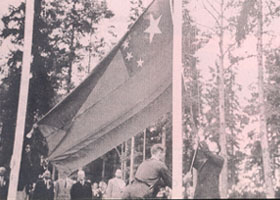1908年,有關(guān)奧運(yùn)會(huì)的最早記載開(kāi)始出現(xiàn)在中國(guó)。據(jù)史書(shū)記載,1922年中國(guó)外交官王正廷當(dāng)選國(guó)際奧委會(huì)委員,那時(shí)的中國(guó)體育組織才得到國(guó)際奧委會(huì)的正式認(rèn)可。然而中國(guó)正式派代表團(tuán)參加奧運(yùn)會(huì)卻是在十年后的1932年,劉長(zhǎng)春作為唯一的參賽選手參加了100米和200米預(yù)賽,雖然因成績(jī)不佳而慘遭淘汰,卻引起了世界對(duì)中國(guó)體育的關(guān)注。然而舊中國(guó)的貧困和后來(lái)國(guó)民政府的冷漠無(wú)能卻讓舊中國(guó)的奧運(yùn)之路舉步艱難,充滿(mǎn)艱難險(xiǎn)阻。

In 1908 the Olympic Games were first mentioned in a Chinese magazine. Already in 1922 Wang Zhengting became the first Chinese member of the IOC, in 1928 China delegated the first observer to the Games in Amsterdam. When rumours spread in 1932 that the government of the Japanese puppet state Mandschuko had plans to participate in the Games in Los Angeles, a delegation of five- one of them a participating athlete- was quickly put together. The Chinese sprinter Liu Changchun entered the 100m as well as the 200m run but could not qualify for the final runs.
China' participation in the 10th Olympic Games in 1932, though by only one athlete, aroused worldwide attention as had not been expected by the Chinese government. At the same time, it felt quite uneasy about the public opinion that the largest country should be represented by such a tiny number of participants. In 1935, or one year before the 11th Olympics, it appropriated nearly 200,000 yuan for preparations, choosing the best athletes and opening up a number of training classes. A delegation was organized, consisting of 69 competitors for athletics, swimming, basketball, football, weightlifting, boxing and cycling; 39 observers and nine demonstrators of the traditional Chinese martial art of wushu. In addition, it was accompanied by 150 journalists and visitors to Berlin at their own expenses.
No Olympic Games were held for the 12th and 13th Olympiads because of the Second World War. In 1947, China started preparations for the 14th Olympic Games slated for the next year. Selective trials and intensive training were held for 10000m, 400m and marathon races, 400m hurdles, 100m freestyle swimming, 1000m cycling, basketball and football, in the hope of tallying some points.
Nevertheless, the Kuomintang government was only lukewarm about participation in the Olympics, allotting no more than US$25,000 for it, with a deficit of US$70,000-80,000 to be collected by the delegation itself, which was thus placed in an awkward position.

On the other hand, the Chinese people and athletes in particular displayed much enthusiasm for the Olympics. Part of the needed funds were raised at home. To make up the balance, the basketball and football teams played 15 and 32 matches respectively to collect money from the gate during a four-month tour to Hong Kong, Saigon, Manila, Bangkok, Singapore, Rangoon and Calcutta, before they arrived in London in late July - just in time for the Olympic Games. To cut down expenses, the delegation brought the needed food with it, amounting to four tons for 48 persons.
The results in competitions were quite disappointing - without a single point to the delegation's credit. To do justice to the athletes, they had done their utmost. Take Lou Wen'ao for instance. He was a deaf-mute and took part in the 10000m and marathon races, during which he developed blisters all over his feet wearing a pair of ordinary shoes made of rubber soles and cloth uppers. The Chinese basketball team placed 18th among the 23 participating squads. The Chinese cyclist, He Haohua, was second in the race but fell from his bike near the finish to dash his hopes for a silver.
What was most embarrassing for the Chinese delegation was that it had to borrow money all the way back home.
For all their poor athletic performances and hardships they met with, the Chinese Olympians would never forget the British people's goodwill and friendship towards them - as expressed in the children's hunt for their autographs, the Londoners' invitations to their homes, and the royal reception at Buckingham Palace - all betokening an international understanding so important for the establishment of a peaceful society after the Second World War, after the Olympics had stopped for 12 years.
(實(shí)習(xí)生張舉良 英語(yǔ)點(diǎn)津boeybb編輯)